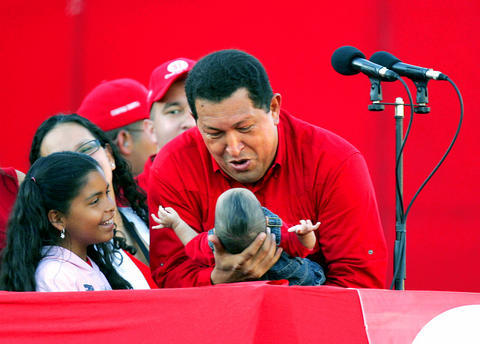A threat by Venezuelan President Hugo Chavez to stop oil exports to the US has raised the stakes over a referendum today that he has called in a bid to expand his powers.
Chavez told tens of thousands of supporters late on Friday he was putting Venezuela's oil field and refineries under military "protection" and would halt the exports "if this [referendum] is used as a pretext to start violence in Venezuela."
He accused the CIA of preparing to spread unrest during the plebiscite in an effort to topple him, and said if its operation was activated "there won't be a drop of oil from Venezuela to the United States."

PHOTO: AP
The menace was an escalation of anti-US rhetoric Chavez has long employed and highlighted both Venezuela's pivotal role as South America's biggest oil producer and the parlous relations between Washington and Caracas.
Venezuela, an OPEC member, currently exports approximately 60 percent of the two million barrels of oil it produces per day to the US, which relies on them for 11 percent of its oil needs.
"Venezuela: We will never be a colony of the United States or of anyone -- we are free," he told supporters.
Chavez faces a real risk of losing the referendum -- an unprecedented situation for the president, who has always triumphed in elections by comfortable margins during his eight-year rule.
The latest polls show a dead-heat in voter intentions, with many Chavez loyalists in Venezuela slums balking at his proposals.
The referendum calls for a scrapping of term limits for the president, opening the way for Chavez to stay on past 2013, when he is due to step down.
The 53-year-old president said on Friday he wanted to reign "until 2050," if the people backed him.
Changes to allow the government to take over the central bank, expropriate private property in the name of "economic socialism" and gag the media in times of emergency are also being proposed.
Opponents, whose number has swelled in past weeks with the defection of some Chavez allies, say the reforms would amount to making Venezuela a Cuba-like communist state, with an elected "dictator."
Chavez, who reveres Cuba's Fidel Castro, dismisses those ranked against him as "traitors" acting to further US "imperialism."
"A vote `yes' is a vote for Chavez -- a vote `no' is a vote for [US President] George W. Bush," he said.

The CIA has a message for Chinese government officials worried about their place in Chinese President Xi Jinping’s (習近平) government: Come work with us. The agency released two Mandarin-language videos on social media on Thursday inviting disgruntled officials to contact the CIA. The recruitment videos posted on YouTube and X racked up more than 5 million views combined in their first day. The outreach comes as CIA Director John Ratcliffe has vowed to boost the agency’s use of intelligence from human sources and its focus on China, which has recently targeted US officials with its own espionage operations. The videos are “aimed at

STEADFAST FRIEND: The bills encourage increased Taiwan-US engagement and address China’s distortion of UN Resolution 2758 to isolate Taiwan internationally The Presidential Office yesterday thanked the US House of Representatives for unanimously passing two Taiwan-related bills highlighting its solid support for Taiwan’s democracy and global participation, and for deepening bilateral relations. One of the bills, the Taiwan Assurance Implementation Act, requires the US Department of State to periodically review its guidelines for engagement with Taiwan, and report to the US Congress on the guidelines and plans to lift self-imposed limitations on US-Taiwan engagement. The other bill is the Taiwan International Solidarity Act, which clarifies that UN Resolution 2758 does not address the issue of the representation of Taiwan or its people in

US Indo-Pacific Commander Admiral Samuel Paparo on Friday expressed concern over the rate at which China is diversifying its military exercises, the Financial Times (FT) reported on Saturday. “The rates of change on the depth and breadth of their exercises is the one non-linear effect that I’ve seen in the last year that wakes me up at night or keeps me up at night,” Paparo was quoted by FT as saying while attending the annual Sedona Forum at the McCain Institute in Arizona. Paparo also expressed concern over the speed with which China was expanding its military. While the US

SHIFT: Taiwan’s better-than-expected first-quarter GDP and signs of weakness in the US have driven global capital back to emerging markets, the central bank head said The central bank yesterday blamed market speculation for the steep rise in the local currency, and urged exporters and financial institutions to stay calm and stop panic sell-offs to avoid hurting their own profitability. The nation’s top monetary policymaker said that it would step in, if necessary, to maintain order and stability in the foreign exchange market. The remarks came as the NT dollar yesterday closed up NT$0.919 to NT$30.145 against the US dollar in Taipei trading, after rising as high as NT$29.59 in intraday trading. The local currency has surged 5.85 percent against the greenback over the past two sessions, central